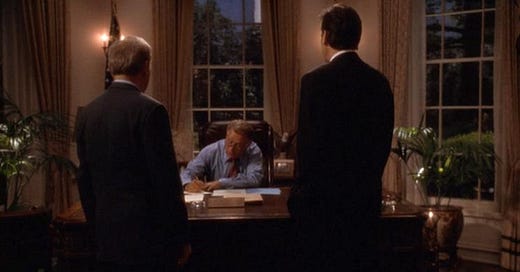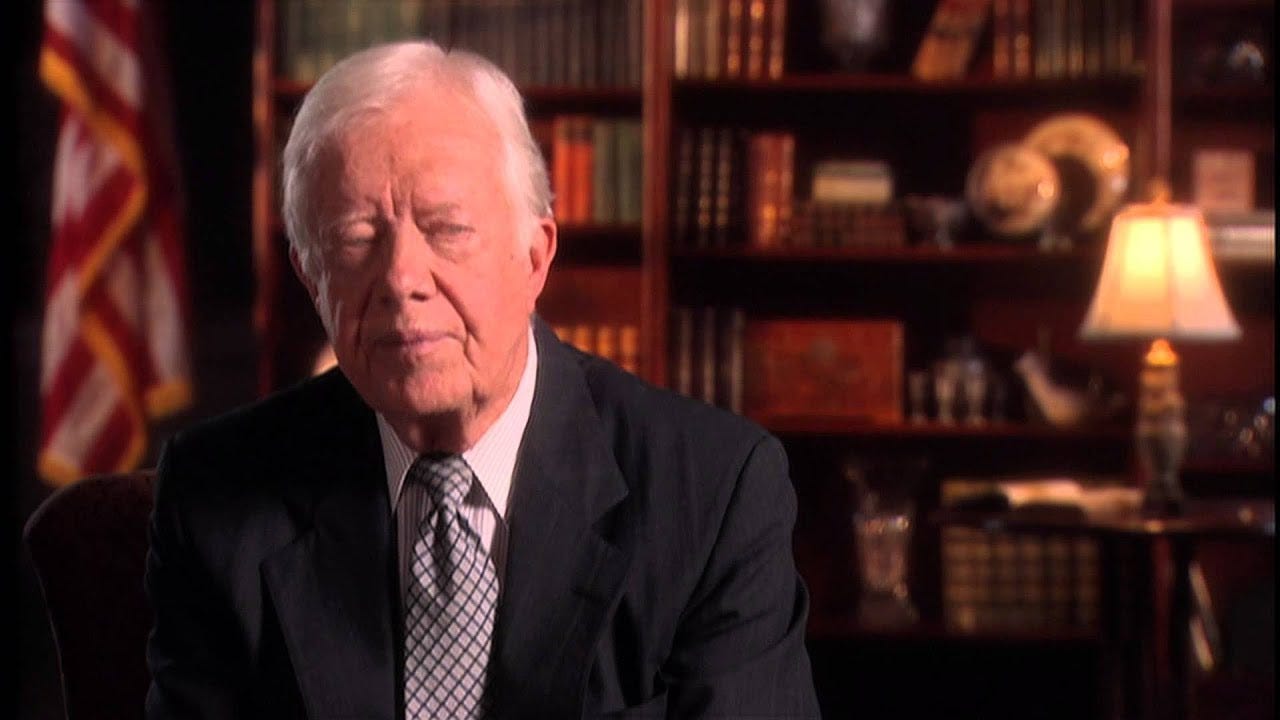Season 3, Episode 17
Aired April 3, 2002
Directed by Jeremy Kagen
Story by Dee Dee Myers, Teleplay by Aaron Sorkin & Eli Attie
Synopsis: Remember earlier in the season when Toby said that if the President is going to win the reelection, it’s going to be on Vice President Hoynes’ coattails? Well, according to new polling data, it appears that the opposite is the case. From the info Josh has, there’s a reasonable replacement for Hoynes- Admiral Fitzwallace. Hoynes is currently under hot water with the right, a far cry from when his name helped Bartlet win the country, and that’s already showing up in a couple of ways.
First of all, the Vice President and Sam need to work out a way to make an upcoming legislature regarding Internet Education that is liable to be passed over due to the VP’s connection. As it’s clear that this is a serious issue to Hoynes, he agrees to take his name off of the bill so it can pass. But more pressing, especially given the recent controversy over the President and Leo’s bombshells, is Hoynes’ own issues with alcoholism. Leo suggests that he comes clean to President Bartlet, although they both agree to keep his White House AA meetings, where the VP recently vouched for Leo, under wraps. When they meet, Vice President Hoynes is direct as he confesses to the President his (shockingly brief) history with booze, and also admits that it’s best if they drop his name from the ballot, although President Bartlet disagrees, writing down why on a piece of paper. When Leo talks to the senior staff later that evening to say as much, he shows them the paper, which distinctly says “because I could die.”
The President has bigger things to worry about, though- a truck loaded with uranium has crashed into a tunnel in Idaho, one that’s 20 miles away from a town, but not much really happens in that regard. Toby gets more screentime with his story, where he meets with HUD Secretary Fisher, who is planning to run for the Governor of New Jersey, which he didn’t run by Communications first. Toby tells Fisher that if he attempts to make another announcement without running it by them first, he’s going back to Jersey for good.
Also, Charlie learns a difficult lesson about tax rebates, while Donna pushes to get her favorite English teacher, on the verge of retirement, a Presidential proclamation. Unfortunately, President Bartlet isn’t able to make this happen, but he gives the White House’s most valued secretary a chance to tell her favorite teacher a special call and a chance to speak to her boss.
The senior staff’s conflicting history with Vice President Hoynes has been a welcome part of the show’s run. His ongoing, if ultimately friendly, strife with President Bartlet and crew have helped to make Tim Matheson’s infrequent appearances stand out, which of course was helped by Matheson’s consistently engaging performance. If anything, it’s a welcome change of pace to have someone with as high ranking of a title as the Vice President himself constantly stand up to Bartlet, as only Leo and Abbey constantly seem willing to do.
I think this is why his potential departure became a soar subject to the President and his staff, even given the previous headaches Hoynes has caused. He may be hotheaded and hungry for his turn in the Oval Office, but no one can say that John Hoynes doesn’t care about his work and the country, to the point that he’s willing to take his name off of a bill he strongly vouches for so it can pass.
Still, no matter how much he may frustrate the hell out of the senior staff, it’s clear that they like the VP enough to do what it takes to keep him on the ballot. Seeing the crew discuss every possible angle to make this happen is endearing, but at the same time, the possibility of swapping him out for Admiral Percy Fitzwallace is all too enticing to not consider. Recall that “Stirred” aired a good five years before Barack Obama became a viable presidential candidate, and that the notion of a Black man in the second highest chair of the country, with a strong potential to move to the first, that has to count for something.
It’s interesting that Fitzwallace became such a hotly discussed name when John Amos doesn’t appear this week- hell, despite a nuclear travesty, we don’t even see the Situation Room- and that’s probably why his name as a replacement for Hoynes never makes it the President. The character of Jed Bartlet respects John Hoynes more than the show seemingly does, noting his insistence that the current Vice President stays for the very real possibility of his passing, and it’s evident now that his earlier insistence that Hoynes stays on the ticket to win Bartlet the south is long over. There’s genuine respect for the two men… but the show doesn’t always prove it.
And I think that’s what makes “Stirred” (named after a noteworthy diss towards James Bond and his preferred martini) an interesting episode, how almost everything comes back to a traditionally divisive character like VP Hoynes, who really isn’t the nuisance he’s always made out to be. As we’ve seen over the course of the show, and is similarly evident today, he does indeed care about many of the same things that the White House does, including sports- he gets a little spiel about hockey that would feel just as right at home with Josh or Sam as it does him.
The non-Hoynes material isn’t as memorable, including Charlie’s frustration that he needs to repay the previous year’s rebate. The lesson is economics would honestly be more welcome for a show like Friends than The West Wing if you asked me, but whatever.
The point of “Stirred” isn’t that taxes can screw you over or that James Bond is a wuss, but that the show needs John Hoynes… at least for now. Sorkin does a fine job of bringing that home.
Aired April 24, 2002
The West Wing was such a cultural force, one that had actual politicians, both former and current, openly discuss its impact and accuracy to White House politics since the moment it aired. It only felt like a matter of time before the show called some of these real-world figures up to discuss its politics. However, instead of waiting for the newly-formed television on DVD market to turn this concept into a bonus feature, the show took time out of its busy schedule to air this documentary on live TV, which makes it eligible for OTH coverage.
Why this happened is beyond me, aside from the likely possibility that Sorkin was exhausted after finetuning yet another season of television and needed some kind of relief to the episode order, especially after coming up with something as quickly as “Isaac and Ishmael”. Sources tend to fluctuate on whether that and this special were a part of the season, which means that season 3 has either 21 or 23 episodes depending on how you view it. I’m covering the special as it aired on television in the middle of the season, although I likely wouldn’t count something like a series retrospective airing before a series finale, although this is included on the bonus disc of season 3.
So how do we talk about this drastic change of form? The West Wing is a lot of things, but a documentary is not one of those- part of Sorkin’s beef with Television Without Pity that was addressed in “The U.S. Poet Laureate” involved critics noting the many gaffes he would make regarding the US government- so it’s a bit jarring to go from fiction to actively discussing real-world politics. The cast doesn’t even show up in talking heads, instead swapping out real past and present White House figures, including a couple of former Presidents in Gerald Ford, Jimmy Carter and Bill Clinton. The only crew member featured is Dee Dee Myers, a current writer for the series who was also Clinton’s Press Secretary, basically making her the real-world analogue for C.J.
The problem I have with going to real-world political discussion is my desire to not make these reviews become a finger-pointing session, which most writing on politics leans toward. My thoughts on The West Wing, and Sorkin’s political beliefs have become clear regardless, but it’s a little different to share my thoughts on his takes regarding foreign policies and social issues than it is to analyze President Clinton’s takes on how The West Wing compares to his days in office… and I don’t know if I really want to do that. This is a little out of my scope for the blog.
As an hour of television, the documentary special offers another welcome take on the White House as it arguably canonizes Sorkin and Schlamme’s structure. Before the age of streaming, when it became much easier to find hours of political documentaries, I can see this be an exciting program for those interested in American politics and don’t mind waiting a week to return to Josh, Sam and C.J.’s adventures.
But for someone watching the show years after the fact who has access to dozens of CNN documentaries with similar ideas, I think this is an interesting relic that I just don’t have much to talk about. See you next time.
This special won an Emmy for Outstanding Special Class Program, because of course it did.
Presidential Records:
It’s been noted that much of Hoynes’ place in the series, including his conflicting status with the President and senior staff, is comparable to President Johnson’s tenure as VP, but if anything, it appears that Bartlet’s crew likes Hoynes more, and vice versa- when Bartlet was shot, Hoynes showed genuine grief, as opposed to Johnson expressing relief that he didn’t have to deal with the “blankety-blank Kennedys” anymore.
Charlie is really spending $499 on a DVD player, and the rest of his $700 refund on a copy of On Her Majesty’s Secret Service? Wow. I bought my Blu-Ray player from a pawn shop for under $20 and got the 007 Blu set, which has everything up to Spectre, for under $50. And now most people don’t even have a DVD player anymore.
“The Tostitos Vice President.” Damn, Josh, that was cold.
Next Time: Back to normal episodes! C.J. gets in hot water, while the President focuses on a terrorist attack.




